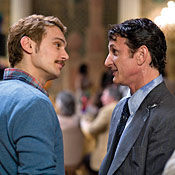- REVIEW
- READER REVIEWS
Milk
|
(No longer in theaters)
|
|
Genre
Drama
Producer
Bruce Cohen, Dan Jinks, Michael London
Distributor
Focus Features
Release Date
Jan 9, 2009
Release Notes
Nationwide
Official Website
Review
While not up there in the annals of transformation with Robert De Niro’s poundage or Daniel Day-Lewis’s palsy, Sean Penn’s smile lines in Milk are a wonder. They’re not crinkles, they’re furrows; they seem to stretch all the way down to his soul. As the gay activist Harvey Milk, who was shot to death in 1978 along with the San Francisco mayor, George Moscone, the volatile Penn is unprecedentedly giddy. There’s anger in his Milk, but it never festers�it’s instantly channeled into political action. In the tedious remake of All the King’s Men, Penn went in for Method-y pauses in the scenes of Willie Stark finding his soapbox voice: He seemed too inward an actor to play a natural rabble-rouser. But as Milk, he shakes off Method self-attention the way Milk shook off the shame of being gay. As the personal becomes political, he opens all the windows and gets visibly high on the breeze.
Milk is a hagiography, but there’s nothing wrong with that if you believe, as director Gus Van Sant and screenwriter Dustin Lance Black obviously do, in the gospel of Harvey Milk. And queer hagiography is bracingly different from that other kind, in that it’s often, so to speak, ass-backward, the road to rebirth leading through the flesh instead of around it. There aren’t many life stories of saints in which the hero’s salvation begins with picking up a studly young Midwesterner in a New York City subway station on the eve of said hero’s 40th birthday. After their happy sex, Milk lies beside Scott Smith (James Franco) and muses on the closeted life he has lived until then. So he sets off with his new lover for San Francisco’s Castro neighborhood, for a life to be lived aboveground, in the light.
Gay writer Black grew up in a military home (whammy) that also happened to be Mormon (double whammy), and he has written episodes of HBO’s dizzying Big Love. His view of the Castro of the early seventies as a sexual Eden is heady, unsullied by post-AIDS hindsight, and Van Sant and cinematographer Harris Savides have an easy touch. There are no hallowed clinches à la Brokeback Mountain; every gay smooch doesn’t carry the weight of the world.
In the flush of all the new arrivals, the Castro is a burgeoning gay ecosystem; Milk, who has opened a camera store, fortifies its roots by singling out businesses for boycott that aren’t homo-friendly, then sets out to become the first openly gay elected officeholder in San Francisco. Lovers drift in and out, but Black and Van Sant ease them to the edge of the frame; we’re not entirely sure why Milk and Smith break off or how Milk could possibly take in a Mexican lover (Diego Luna) who is so egregiously, epically crazy.
The filmmakers don’t pry, possibly because so many people in Milk’s orbit are still around (and on the set), but more likely because they mean for Milk to be so psychologically upbeat�to inspire future activists. That’s laudable, especially now, with the passage of Proposition 8 in Milk’s old stomping grounds. But it doesn’t make for great drama. The threats are largely from the outside, from Anita Bryant and, of course, Milk’s murderer, uptight fellow supervisor Dan White (Josh Brolin with a bowl haircut). Milk refers to him as a closet case, but it’s unclear what White is except confused (then violent), but Brolin is always busy playing something. He’s the only actor with a meaty subtext. Good as Penn is, it’s too bad he didn’t have a chance to show us Milk before his emergence�not for the same old coming-out-of-the-closet story, but because the �Before� picture (Milk among the straights) would give the �After� more weight. Milk is one of the most heartfelt portraits of a politician ever made�the man himself remains just out of reach.
Related Stories
Featured In
- How Emile Hirsch Became a Man of 'Milk' (12/1/08)
